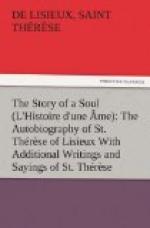Whatever may happen, all earthly events, be they happy or sad, will be but distant sounds, unable to awake a vibration from the harp of Jesus. He reserves to Himself alone the right of lightly touching its strings.
I cannot think without delight of that sweet saint, Cecilia. What an example she gives us! In the midst of a pagan world, in the very heart of danger, at the moment when she was to be united to a man whose love was so utterly of earth, it seems to me as if she should have wept and trembled with fear. But instead, “during the music of the marriage-feast Cecilia kept singing in her heart."[37] What perfect resignation! No doubt she heard other melodies than those of this world; her Divine Spouse too was singing, and the Angels repeated in chorus the refrain of Bethlehem’s blessed night: “Glory to God in the highest, and on earth peace to men of goodwill."[38]
The Glory of God! St. Cecilia understood it well, and longed for it with all her heart. She guessed that her Jesus was thirsting for souls . . . and that is why her whole desire was to bring to Him quickly the soul of the young Roman, whose only thought was of human glory. This wise Virgin will make of him a Martyr, and multitudes will follow in his footsteps. She knows no fear: the Angels in their song made promise of peace. She knows that the Prince of Peace is bound to protect her, to guard her virginity, and to make her recompense. . . . “Oh, how beautiful is the chaste generation!"[39]
Dearest sister, I hardly know what I write; I let my pen follow the dictates of my heart. You tell me that you feel your weakness, but that is a grace. It is Our Lord Who sows the seeds of distrust of self in your soul. Do not be afraid! If you do not fail to give Him pleasure in small things, he will be obliged to help you in great ones.
The Apostles laboured long without Him, they toiled a whole night and caught no fish. Their labours were not inacceptable to him, but He wished to prove that He is the Giver of all things. So an act of humility was asked of the Apostles, and Our loving Lord called to them: “Children, have you anything to eat?"[40] St. Peter, avowing his helplessness, cried out: “Lord, we have laboured all the night, and have taken nothing."[41] It is enough, the Heart of Jesus is touched. . . . Had the Apostle caught some small fish, perhaps our Divine Master would not have worked a miracle; but he had caught nothing, and so through the power and goodness of God his nets were soon filled with great fishes. Such is Our Lord’s way. He gives as God—with divine largesse—but He insists on humility of heart.
XVIII
July 7, 1894.
MY DEAR LITTLE SISTER,—I do not know if you are still in the same frame of mind as when you last wrote to me; I presume that you are, and I answer with this passage of the Canticle of Canticles, which explains so well the state of a soul in utter dryness, a soul which cannot find joy or consolation in anything: “I went down into the garden of nut-trees to see the fruits of the valleys, and to look if the vineyard had flourished, and the pomegranates were in bud. I no longer knew where I was: my soul was troubled because of the chariots of Aminadab."[42]




